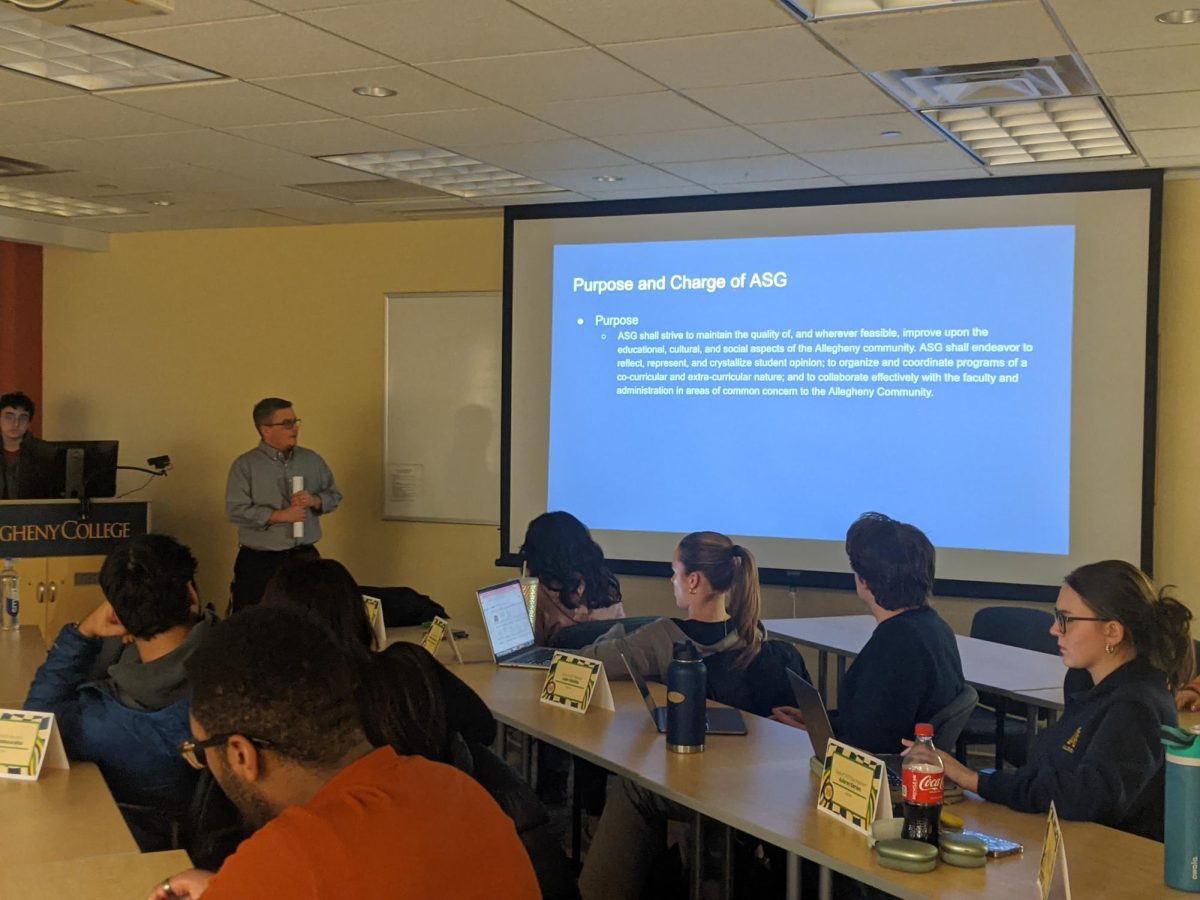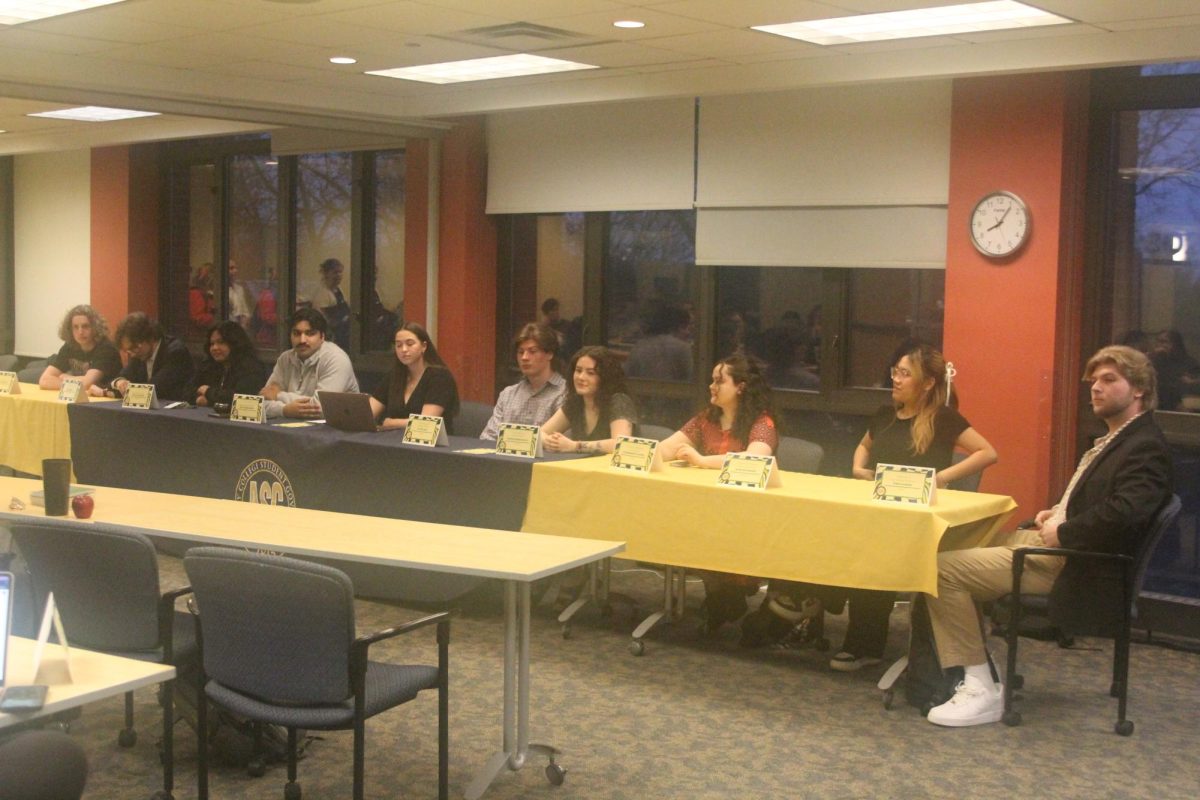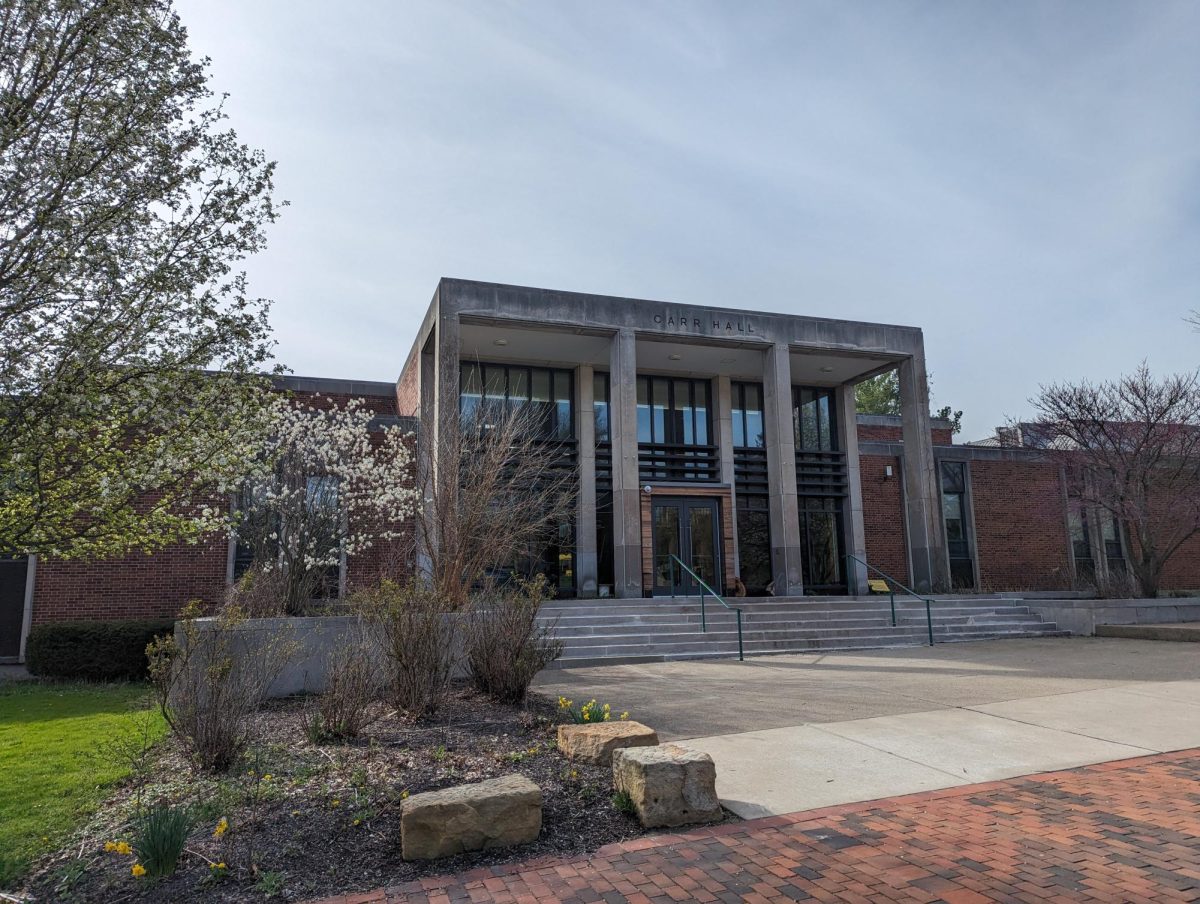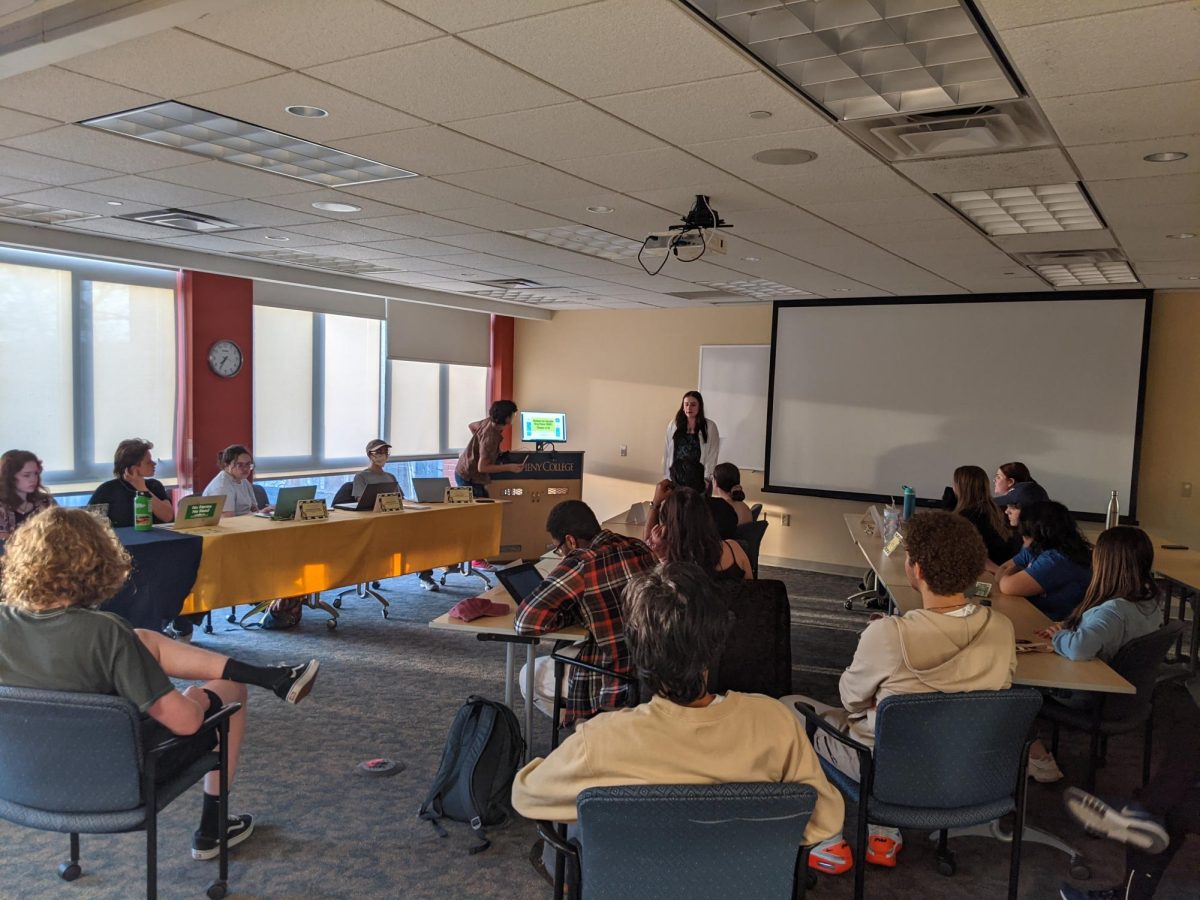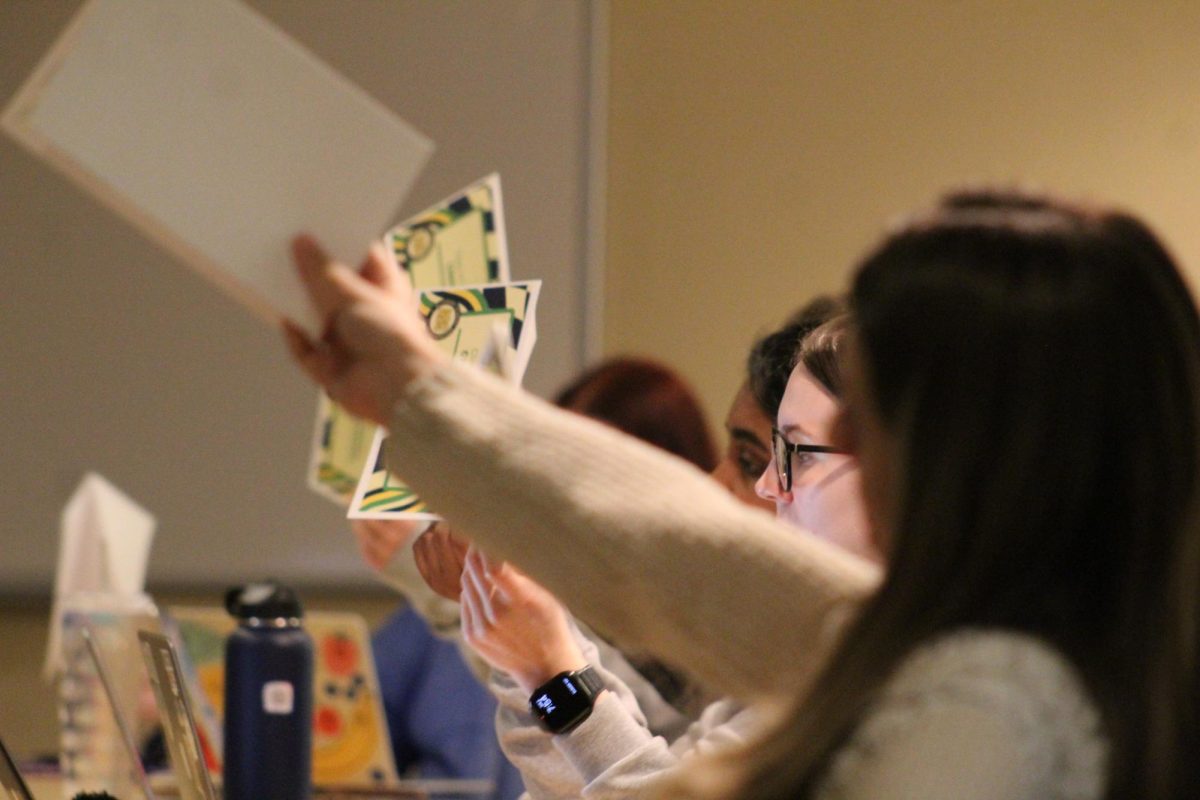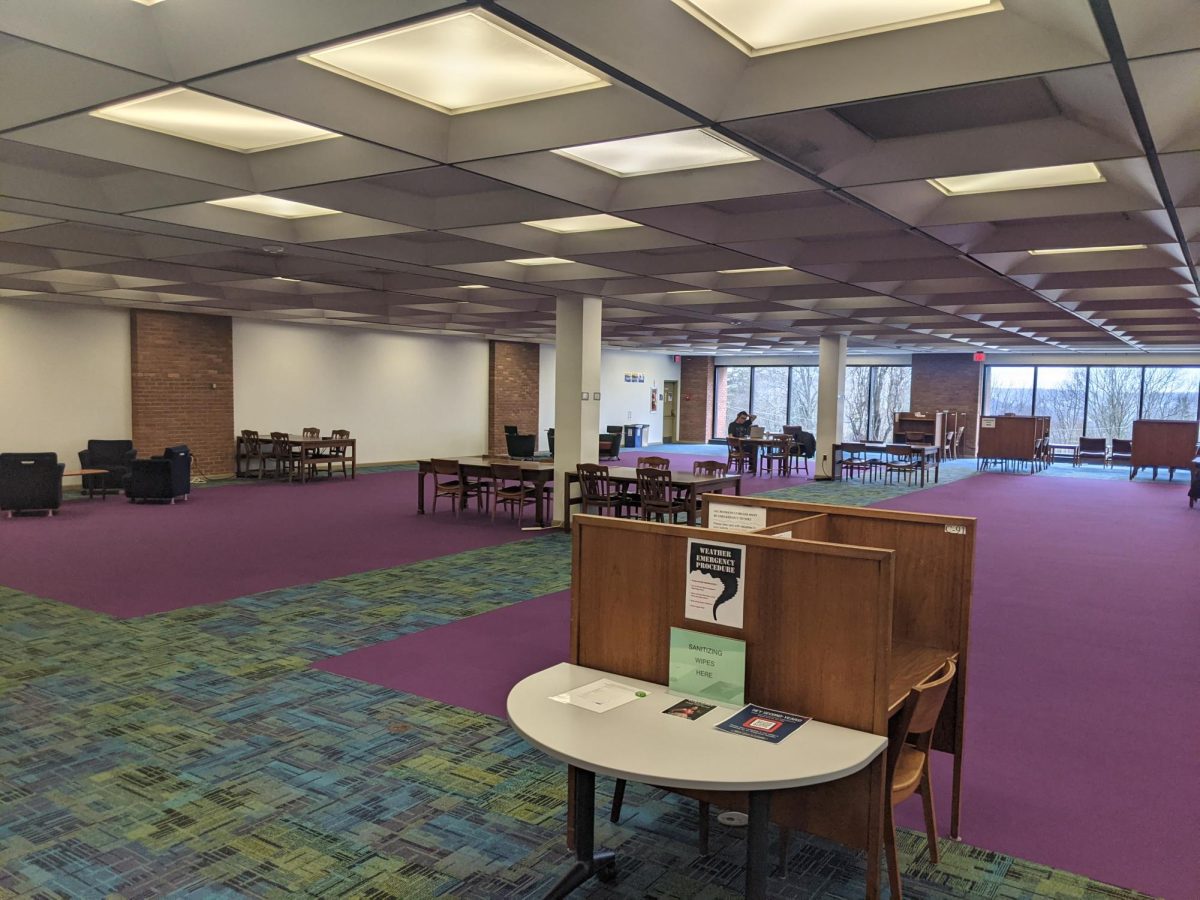The Allegheny Student Government heard a presentation about expectations and an update about student finances at their first meeting of the semester on Tuesday, Jan. 13. Both conversations, however, have raised additional questions about the way the body functions.
The first half of the meeting was occupied by a presentation from Dean for Student Life Trae Yeckley, who also serves as ASG’s adviser. Yeckley walked through a number of reminders of both parliamentary procedure and constitutional regulation.
“I put together a little brief presentation just to kind of make sure that everyone’s on the same page,” Yeckley said during their introduction. “Normally, this is done at the start of the year with some sort of retreat. We didn’t do that this year.”
Unfilled seats
As part of his presentation, Yeckley listed examples of different votes and when they would be used — among them the process of filling an empty senatorial position.
“Appointing senators to unfilled seats needs a two-thirds majority as well,” Yeckley said, referring to the ASG constitution.
However, it does not appear that votes took place for two appointed senators last semester. Both Kyra Jordan, ’25, and Lizy Chovatia, ’26, joined the senate between the Oct. 24 and Oct. 31 GAs — though no motions approving their appointment are listed in either meeting’s minutes.
Attorney General Will Lowthert, ’24, said that votes did happen — just within each individual class, which Lowthert said was more democratic than having the entire senate vote on a replacement.
“(Class of 2025 President Assad Bell), (Senator Lexi Costanza, ’25,) and then (Senator Ray Colabawalla, ’25,) all voted on putting in KJ (Jordan),” Lowthert said. “That ensures that the Class of 2025, them being representatives of all members of the junior class, in essence give KJ the power to actually represent them, rather than all the other classes, all the other student bodies having a say on who represents the Class of 2025.”
Lowthert said the decision was based in part on precedent set by last year’s attorney general, Abigail Estrada-Hernandez, ’25.
“It’s a mixture of precedent and interpretation, pulling from both the election rules and then also the rules of how you put in a new senator,” Lowthert said.
Article III Section 1, Subsection 5 of the ASG constitution states: “If any seats on Senate are vacant at any given time, the Senate members of the respective class will nominate permanent proxies to fill the vacancies, upon supermajority approval of the Senate.”
Speaking immediately after the meeting, Yeckley said that any improperly-filled vacancies would need to be revisited.
“If they weren’t voted in the way that the constitution says that they were voted in, then we need to go in and revote them in,” Yeckley said after the meeting. “If there was any legislation that was passed with their votes that would have swayed a vote, then I think we need to go back and revisit that.”
It is unclear if any votes would have been swayed by either senator; the vote for Strobel’s nomination — by far the closest vote — was a 4-4 decision, with seven abstentions. Chovatia was absent for the vote, while Jordan abstained.
Jordan also co-sponsored a constitutional amendment pushed through at the end of last semester that split the treasurer position in two; Lowthert said that both the amendments and any close votes were not under question, since the vacancies had been properly filled in the first place.
ASG President Nicole Recio Bremer, ’25, said in an email statement Thursday that, “(ASG Vice President Sam Ault, ’26) and I are very grateful to have these conversations so we can clarify any questions that our constituents might have. We really encourage students to keep questioning, this helps us better represent our student body.”
Remainder of presentation
Yeckley’s presentation included a number of reminders about ASG’s own constitution, including that poor academic standing and violations of the Honor Code and Statement of Community are punishable by removal from office. Yeckley added a reminder that, including ASG, any student can be removed from a club by the dean’s office for non-academic conduct.
“You get into a fistfight with someone in ASG, both of you probably aren’t going to be in ASG anymore,” Yeckley told the members.
In addition to discussing the constitution, Yeckley worked through tips from Robert’s Rules, the set of parliamentary procedures used by ASG. He reviewed how motions work — including stating that all motions have time for a debate — and reminded students to remain respectful and focused during discussions.
The presentation was driven in part by the student government itself, according to Yeckley.
“I heard the feedback last semester, especially from some of our first- and second-year senators — or folks that hadn’t been on ASG before — saying that they weren’t quite as familiar with things like Robert’s Rules or some of the expectations,” Yeckley said.
Parliamentary procedure played a key role in a controversial vote last semester. Andrew Strobel, ’24 was voted down with no prior debate, with senators only explaining their votes after Strobel’s nomination was killed.
The following week saw a tense GA; when Strobel questioned senators on their votes some student representatives said they were not aware they could hold a debate and hit back on the idea that their vote did not represent students’ wishes. At one point, Yeckley had to step in and stop a senator that had started to raise their voice.
Decorum in GA was Yeckley’s final topic; they reminded the student government that Robert’s Rules required members to address the chair and not refer to other members by name. Yeckley also said that ASG members should be cognizant of their conduct beyond official acts.
“Just remember that people see you as members of ASG,” Yeckley said. “That students are looking at you as representatives of whatever student organization that they know you to be a part of.”
Finances
During their cabinet report, Ault provided an update of how much clubs had spent since the start of the academic year.
ASG started the year with $335,000 in the General Fund and just over $500,000 in the Surplus Fund. Since then, student organizations have spent $133,476.38 — around $123,000 from the General Fund, and just over $10,000 from the Surplus Fund , according to Ault. This means that students have used 37% of the General Fund and 1.8% of the Surplus Fund, they said.
“This puts us roughly — but slightly behind — on pace with last year’s spending,” Ault said.
This report kicked off a discussion about ASG finances, starting with a question from Lowthert.
“How did our General Fund, which comes from the student activity fee, remain in essence, the exact same from last year, and the year before, even though our student body has dropped 400 people since 2020?” Lowthert said. “Also, when you did your calculations, are you taking into account that we’re spending more per student than we historically have?”
Ault replied that it was a good thing that students are spending from the General Fund, saying that underspending during the COVID-19 pandemic has created the massive surplus ASG has had for the last few years.
Senator Aubrey Carion, ’27, also spoke up, though with a comment, not a question.
“I think that some clubs spend a lot more than other clubs — like a lot more,” Carion said.
In reply, Ault said that they are planning to produce additional analysis of club spending by club, as well as any other specific analyses senators would like.
However, Director of Community Relations Cam Lesher, ’24, cautioned against focusing on the biggest spenders given ASG’s current financial outlay.
“I don’t think that we need to be putting undue worry onto the 37% that we’ve spent for half of the year, because I do not foresee us going over that,” Lesher said.
ASG also approved a total of $11,107.72 in club spending for the first week. Ault said that these funding requests had come in throughout the winter break and did not restart at a specific time.
“We never closed the (finance request) form, we just weren’t reviewing them while GA wasn’t in session,” Ault said after the meeting.
Club Adviser Summit
During her report, Recio Bremer announced that there would be a “Club Advisor Summit” on Feb. 6 and 8, and during “Adviser Announcements,” Yeckley elaborated.
“It’s mainly just a chance for advisers to come and have a conversation about what it entails to be an adviser, because we want students to feel better supported in their clubs and organizations,” Yeckley said.
More information is expected in a MyAllegheny post next week, they added.
ASG will next meet on Tuesday, Jan. 30, at 7:30 p.m. in room 301/302 of the Henderson Campus Center. The Honor Committee is scheduled to appear to speak with the student government.



